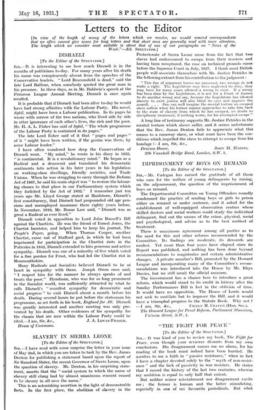Letters to the Editor
[In view of the length of many of the letters which we receive, we would remind correspondents that we often cannot give space for long letters and that short ones are generally read with more attention. The length which we consider most suitable is about that of one of our paragraphs on " News of the Week."—Ed. SPECTATOR.]
DISRAELI
jTo the Editor of the SPECTATOR.] SIR,—It is interesting to see how much Disraeli is in the mouths of politicians to-day. For many years after his death his name was conspicuously absent from the speeches of the Conservative leaders. " Lord Beaconsfield is dead," said the
late Lord Balfour, when somebody quoted the great man in his presence. In these days, as in Mr. Baldwin's speech at the Primrose League Annual Meeting, Disraeli is once, again recalled.
It is probable that if Disraeli had been alive to-day he would
have had strong affinities with the Labour Party. His novel, Sybil, might have been a Labour publication. In its pages he wrote with sorrow of the two nations, who lived side by side in utter ignorance of each other's lives, the rich and the poor. Mr. H. A. L. Fisher has said of Sybil, " The whole programme of the Labour Party is contained in its pages."
The late Lord Esher said of it that " pages and pages " of it " might have been written, if the genius was there, by some Labour leader."
I have often wondered how deep the Conservatism of Disraeli went. "My mind," he wrote in his diary in 1833, " is continental. It is a revolutionary mind." He began as a Radical and a democrat and translated his democratic sentiments into action in his later years in his legislation on working-class dwellings, friendly societies, and Trade Unions. When he was struggling to carry through the Reform Act of 1867, he said his main object was " to restore the labour- ing classes to that place in our Parliamentary system which they forfeited by the Act of 1832." I remember just ten years ago Mr. Lloyd George stated at Maidstone, Disraeli's first constituency, that Disraeli had propounded old age pen- sions and unemployed insurance there eighty years before. In November, 1919, Mr. Boner Law said, " Disraeli was as great a Radical as ever lived."
Disraeli voted in opposition to Lord John Russell's Bill
against the Chartists. He was the friend of Ernest Jones, the Chartist barrister, and helped him to keep his journal, The People's Paper, going. When Thomas Cooper, another Chartist, came out of Stafford gaol, in which he had been imprisoned for participation in the. Chartist riots in the Potteries in 1842, Disraeli extended to him generous and active sympathy. Disraeli was one of a minority of five which voted for a .free pardon for Frost, who had led the Chartist riot in Monmouthshire.
Many Radicals and Socialists believed Disraeli to be at
heart in sympathy with them. Joseph Owen once said, " I respect him for the manner he always speaks of and treats the poor." Hyndman, who was for so long prominent in the Socialist world, was sufficiently attracted by what he calls Disraeli's " manifest sympathy for democratic and social progress" to visit Disraeli about a month before his death. During several hours he put before the statesman his programme, as set forth in his book, England for All. Disraeli was greatly interested and another meeting was only pre- vented by his death. Other evidences of his sympathy for the classes that are now within the Labour Party could be


















































 Previous page
Previous page